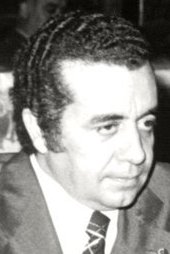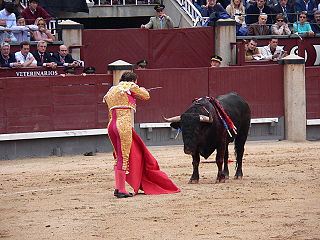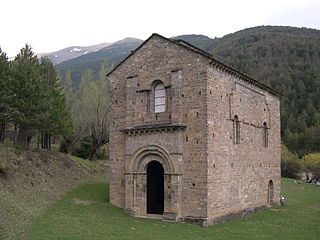Contents
| |||||
| Decades: | |||||
|---|---|---|---|---|---|
| See also: | |||||
Events from 2011 in Catalonia .
| |||||
| Decades: | |||||
|---|---|---|---|---|---|
| See also: | |||||
Events from 2011 in Catalonia .

Catalonia is an autonomous community of Spain, designated as a nationality by its Statute of Autonomy. Most of its territory is situated on the northeast of the Iberian Peninsula, to the south of the Pyrenees mountain range. Catalonia is administratively divided into four provinces or eight vegueries (regions), which are in turn divided into 43 comarques. The capital and largest city, Barcelona, is the second-most populous municipality in Spain and the fifth-most populous urban area in the European Union.

Jallikattu, also known as Eru Taḻuvuṭal and Manju-virattu, is a traditional event in which a zebu bull, such as the Pulikulam or Kangayam breeds, is released into a crowd of people, and many people attempt to grab the large hump on the bull's back with both arms and hang on to it while the bull attempts to escape. They hold the hump for as long as possible, attempting to bring the bull to a stop. In some cases, they must ride long enough to remove flags on the bull's horns or cross a finish line.

The Catalan independence movement is a social and political movement which seeks the independence of Catalonia from Spain.

World Animal Protection, formerly The World Society for the Protection of Animals (WSPA), is an international non-profit animal welfare organization that has been in operation since 1981. The charity's mission is to create a better world for animals by protecting them.

Albert Boadella Oncins is a Spanish actor and playwright. He was one of the founding members of the Els Joglars theatre company, and its director from 1962 to 2012.

Lorenzo Olarte Cullen was a Canarian politician and lawyer. He was president of the Canary Islands autonomous region but served only three years of his four-year term.

Spanish-style bullfighting is a type of bullfighting that is practiced in several Spanish-speaking countries: Spain, Mexico, Ecuador, Venezuela, Peru, as well as in parts of southern France and Portugal. In Colombia it has been outlawed but is being phased out with a full ban coming in effect in 2027. This style of bullfighting involves a physical contest with humans attempting to publicly subdue, immobilize, or kill a bull. The most common bull used is the Spanish Fighting Bull, a type of cattle native to the Iberian Peninsula. This style of bullfighting is seen to be both a sport and performance art. The red colour of the cape is a matter of tradition – bulls are color blind. They attack moving objects; the brightly-colored cape is used to mask blood stains.

Portuguese-style bullfighting differs in many aspects from Spanish-style bullfighting, most notably in the fact that the bull is not killed in front of an audience in the arena. The cavaleiros and the forcados are unique to the Portuguese variety of bullfighting, as well as the participation of horsewomen (cavaleiras) in the routines.

An anti-bullfighting city is a city that formally adheres to a declaration of ethics and adopts municipal policies that do not support the practice of bullfighting within their borders and state that they are against the practice of bullfighting altogether.

Alexander Rupert Fiske-Harrison is an English author, journalist and conservationist.

Bullfighting is a physical contest that involves a bullfighter attempting to subdue, immobilize, or kill a bull, usually according to a set of rules, guidelines, or cultural expectations.

A Bien de Interés Cultural is a category of the heritage register in Spain. The term is also used in Colombia and other Spanish-speaking countries.
Bullfighting was banned in the Spanish autonomous community of Catalonia by a vote of the Catalan Parliament in July 2010. The ban came into effect on 1 January 2012. The last bullfight in the region took place on 25 September 2011 at La Monumental. The ban was officially annulled for being unconstitutional by Spain's highest court on 5 October 2016. However, despite the overturning of the ban, no further bullfight had taken place in Catalonia as of July 2020.

The Plaza de Toros Monumental de Barcelona, often known simply as La Monumental, is a bullring in the city of Barcelona, Catalonia, Spain. It was the last bullfighting arena in commercial operation in Catalonia. It was inaugurated in 1914 under the name Plaza de El Sport and was soon expanded and given its current name in 1916. It is situated at the confluence of the Gran Via and Carrer Marina in the Eixample district. It has a capacity of 19,582 within 26 rows of lines, boxes, and stands on the first floor inside and an upper gallery surrounding the building.
Events in the year 2010 in Spain.

The Toro de la Vega is a Spanish medieval bull festival and tournament celebrated in the town of Tordesillas in Valladolid, Spain. The tournament consists of hundreds of lancers chasing – either by foot or on horseback – a bull through town streets, corralling it into an open area. Once the bull has been drawn out away from town, it is killed by spearing. The tournament follows a series of strict rules and procedures dating back to the mid 16th century.

Bull wrestling, cow fighting or bull fighting is a non-lethal human-facilitated bloodsport between bulls or cows found in some parts of the world.
Animal welfare and rights in Spain is about the treatment of and laws concerning non-human animals in Spain. Spain has moderate animal protections by international standards.

Jordi Casamitjana is a vegan, zoologist, animal protection campaigner, and animal rights activist.